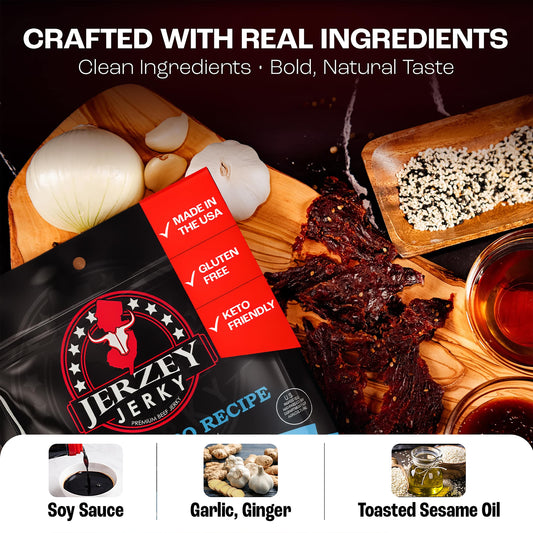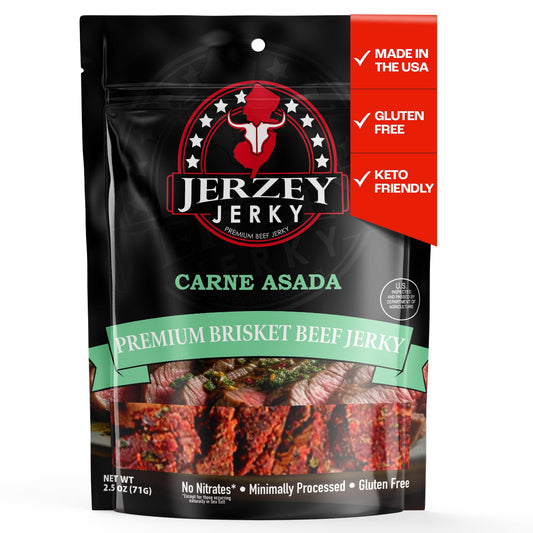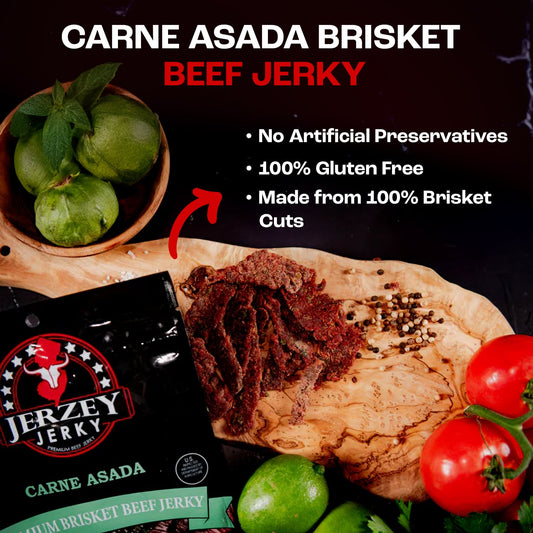
How Long Does Beef Jerky Last?
Properly dried beef jerky is imperishable, which means it’s durable for years, but loses its taste, color, and smell. The duration of homemade jerky is 1 to 2 months. Unopened commercial jerky lasts up to 1–2 years, which depends on the packaging and preservatives used. Opened jerky typically lasts up to 1 week at room temperature or 1–2 weeks if refrigerated. Direct contact with air and moisture results in the dryness of beef jerky. Lean meat is preferred for both homemade and commercial purposes, as fats result in spoilage.

What are the Factors That Affect Jerky Shelf Life?
Here are four factors affecting the shelf life of beef jerky:
-
Moisture Content: The moisture concentration impacts the taste, texture, and shelf life of jerky badly. High moisture level leads to bacterial growth and eventually spoils it. At optimal conditions, it tastes good, the texture remains fine, and it stays safe for an extended period.
-
Packaging Method: It controls moisture and limits oxygen to reduce oxidation. Vacuum sealing is used to remove extra air to minimize microbial growth and oxidation. Nitrogen-flushed bags replace the oxygen with inert gas, preventing rancidity. Both these methods minimize oxygen exposure, a key reason behind spoilage. Use of Ziploc bags is the least favorable method.
-
Preservatives Used: Sodium nitrite and sodium erythorbate are commonly used in jerky preservation. Sodium nitrite prevents pathogens growth. Sodium Erythorbate speeds up the curing process and maintains the jerky’s pinkish color. Products with nitrates, nitrites, or curing agents usually last longer.
-
Storage Conditions: High temperature, light, air, and moisture affect the beef jerky badly. Air carries oxygen, which leads to fat deterioration and hence spoilage. Light increases the dehydration process, resulting in discoloration. An ideal temperature for jerky storage is 35°F-70°F. Excessive temperature also dries it too much, resulting in texture loss. Moisture leads to mold growth and shortens the shelf life of beef jerky.
Shop the best-selling Carne Asada Beef Jerky - Brisket & Straight Whiskey Beef Jerky - Brisket !
How to Store Beef Jerky Properly?
Here are the three steps to store beef jerky carefully:
-
Store in a Cool, Dry Place: Heat and moisture spoil it rapidly. A kitchen cabinet or cupboard away from steam and sunlight works best. These spots keep the jerky dry and safe and also prevent mold growth. When you store it in an open place, it’s best to consume it in a few days for optimal freshness.
-
Prevents air exposure: After opening, it’s better to keep jerky in the fridge or air-proof bags. This reduces contact with air, moisture, and bacteria. A sealed container works well inside the fridge. Rely on food bags or jars with tight lids. It keeps the jerky fresh, safe, and ready to eat.
-
Freeze for Long-Term Storage: Freezing helps keep jerky fresh for a long period. It remains safe in the freezer for up to six months, taste and texture remain the same. Use sealed bags or containers to protect jerky in the freezer.
How to Check If Jerky Has Expired?
Below are four signs that show the jerky has gone bad.
- Odd or Sour Smell: Spoiled jerky often has a sour, rancid, or musty odour. It doesn’t smell like normal dried meat. This pungent smell means bacteria have started growing. Good jerky smells clean and meaty. A foul, ammonia, or sulfur-like smell is a clear sign to discard it.
- Change in Texture or Color: It turns overly hard, making it difficult to chew. It becomes slimy or sticky, which is a strong sign of spoilage. The surface feels wet or greasy, rather than dry. Color changes are also common. Fresh jerky has an even, dark red or brown colour.
- Visible Mold: Mold shows as a white, green, or spider-web-like structure on the surface. These patches develop when jerky comes in contact with moisture, air, or improper storage conditions. Molds result in mycotoxins production which cause illness. It's not visible, but it spreads its root structure deep in the jerky. Eating moldy jerky results in respiratory disorders or severe toxicity.
- Off Taste or Staleness: Spoiled jerky often has a strange or unpleasant taste. It tastes bitter or sour. Spicy or salty flavours hide the signs of spoilage. This makes it harder to notice if the jerky has gone bad just by taste.
What are the Tips to Extend the Shelf Life of Jerky?
Here are seven tips to extend the shelf life of jerky:
-
Oxygen absorbers: Remove oxygen from containers and airtight bags. Pathogens and mold cannot grow in the absence of oxygen. This method is mostly used when jerky needs to be reserved for an extended period.
-
Airtight containers: An airtight container prevents moisture and bacterial growth. Vacuum-sealed containers keep the jerky fresh even after opening, and also prevent contamination. It prevents jerky from absorbing unwanted odours. Mostly used in home-made jerky storage, as it lacks commercial preservatives.
-
Keep it dry: Ensure that the jerky is completely dried before storing. Use paper towels or silica gel packs to absorb extra humidity. Always save it in a sheltered spot, away from sinks, steam, or damp areas. Even a small amount of moisture affects its texture and taste.
-
Refrigerate or freeze: Refrigerating or freezing jerky keeps it fresh for longer. While the fridge is good for short-term preservation(1-2 weeks), the freezer works better for the long preservation(6-12 months).
-
Labelling: Label jerky with the preparation date to track freshness. It indicates the age of the jerky to avoid guessing. Always mark the date before storing, to avoid eating spoiled jerky. It also specifies the type of jerky.
-
Heat or direct sunlight: Keep jerky out of direct sunlight or heat. Heat causes fat to spoil faster. Sunlight also leads to moisture loss and changes in taste. A cool, shaded spot keeps jerky safe for a longer period.
-
Avoid Reopening: Repeatedly opening the jerky pack causes air and moisture to spoil the jerky. To prevent this, divide it into small portions. Use an airtight bag or container to store pieces separately. This keeps the jerky fresh for an extended time.
How Long Does Homemade Jerky Last Compared to Store-Bought?
Unopened store-bought jerky lasts up to 1 year, while homemade jerky lasts 1-2 months. As it passes through commercial drying methods, and contains preservatives (like sodium nitrite) which prevent spoilage. If the pack stays sealed, store-bought jerky lasts up to 12 months. Homemade jerky doesn’t last that long due to a lack of preservatives, variations in drying, and less secure packaging. Its use period is around 12 days at room temperature. It stays usable for 4 to 8 weeks in the fridge. Freezing is the most effective method for extended storage. It is essential to vacuum-seal and dry the jerky properly to extend its shelf life.










